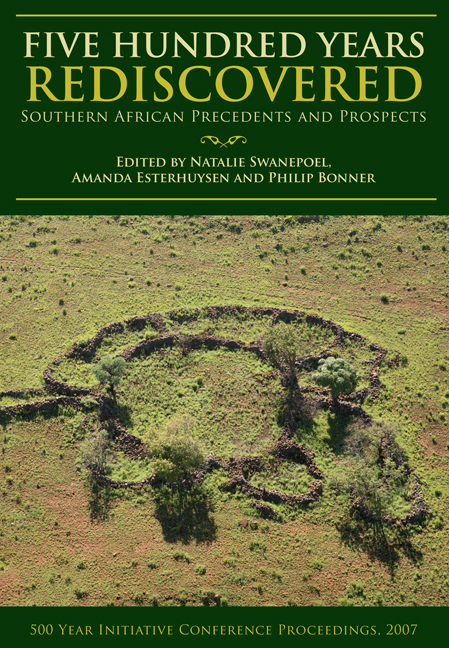Book contents
- Frontmatter
- Contents
- Preface
- 1 Introduction
- Section 1 Disciplinary Identities: Methodological Considerations
- 2 Historical archaeologies of southern Africa: precedents and prospects
- 3 South Africa in Africa more than five hundred years ago: some questions
- 4 Towards an outline of the oral geography, historical identity and political economy of the Late Precolonial Tswana in the Rustenburg region
- 5 Metals beyond frontiers: exploring the production, distribution and use of metals in the Free State grasslands, South Africa
- 6 deTuin, a 19th-century mission station in the Northern Cape
- 7 Reinterpreting the origins of Dzata: archaeology and legends
- Section 2 Material Identities
- Section 3 ‘Troubled Times’: Warfare, State Formation and Migration in the Interior
- List of contributors
- Index
4 - Towards an outline of the oral geography, historical identity and political economy of the Late Precolonial Tswana in the Rustenburg region
from Section 1 - Disciplinary Identities: Methodological Considerations
Published online by Cambridge University Press: 30 May 2019
- Frontmatter
- Contents
- Preface
- 1 Introduction
- Section 1 Disciplinary Identities: Methodological Considerations
- 2 Historical archaeologies of southern Africa: precedents and prospects
- 3 South Africa in Africa more than five hundred years ago: some questions
- 4 Towards an outline of the oral geography, historical identity and political economy of the Late Precolonial Tswana in the Rustenburg region
- 5 Metals beyond frontiers: exploring the production, distribution and use of metals in the Free State grasslands, South Africa
- 6 deTuin, a 19th-century mission station in the Northern Cape
- 7 Reinterpreting the origins of Dzata: archaeology and legends
- Section 2 Material Identities
- Section 3 ‘Troubled Times’: Warfare, State Formation and Migration in the Interior
- List of contributors
- Index
Summary
Introduction
The purpose of this paper is to offer a broad outline of historical developments in the wider Rustenburg region from about 1700 AD to the late 1820s. While both the oral and the archaeological records are addressed, the emphasis is on the latter because previous reviews by Parsons (1995) and Manson (1995) have already provided an in-depth discussion of the oral material from this period. Our concern is to build upon these insights and explore ideas about their profitable combination with archaeological evidence.
Such a project falls within the ambit of historical archaeology and the methodological and interpretive relationship between material culture and texts. There is a significant literature on how this relationship is meant to work. Most agree that a unidirectional outcome in which one source simply confirms what is evident in the other is a waste of time. In contrast, most would aspire to an aim that profitably combines sources in order to take interpretation into areas that neither source could penetrate in isolation. At the centre of attaining a balance between sources is the issue of evidential scale (see Deetz 1988). Archaeological evidence can only translate into general perspectives on the past and tends to emphasise cultural concerns, while historical interpretation is more detailed and addresses specific context and the actions and agency of named players. In this regard, a key issue is whether the scale of identity glimpsed through the oral records, on the one hand, can be reconciled with the conventional use of ceramic and settlement style as identity, on the other.
This focus on the relationship between archaeology and oral texts is an important project for the 18th and early 19th century. This is because it was a period of significant change within Sotho-Tswana communities, which saw dramatic change in the scale of political, social and economic organisation. Very broadly, early in the 18th century, moderately dispersed communities lived within relatively unconstrained space, while by the early 19th century, chiefdoms were pushing increasingly harder against each other and against the environment in which they were situated. Some chiefdoms decayed both from the external pressure of their neighbours and internal dispute, and lost economic independence, while others mounted aggressive takeovers.
- Type
- Chapter
- Information
- Five Hundred Years RediscoveredSouthern African precedents and prospects, pp. 55 - 86Publisher: Wits University PressPrint publication year: 2008



